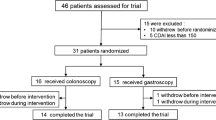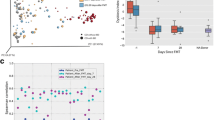Abstract
Akkermansia muciniphila is a promising probiotic in the gut. This study aimed to determine the presence and abundance of Akkermansia in patients with inflammatory bowel disease (IBD) who underwent washed microbiota transplantation (WMT) in order to elucidate the relationship between its level and patients’ clinical data and outcomes. A cohort of Chinese volunteers including 80 healthy controls (HC), 43 patients with ulcerative colitis (UC), and 57 patients with Crohn’s disease (CD) were recruited. Akkermansia presented a low colonization rate of 48.8% and a relative abundance of 0.07% in a healthy Chinese population. Compared with HC, significantly lower colonization and abundance of Akkermansia were found in UC and CD (p < 0.01, p < 0.001, respectively). The combination of Akkermansia and twelve other gut commensal bacteria significantly enriched in healthy individuals could be conductive to discriminate IBD from HC. Co-occurrence of Akkermansia-Faecalibacterium prausnitzii was at a lower level in IBD. Patients’ age could affect the abundance of Akkermansia in CD. After WMT, 53.7% of patients achieved clinical response, and the colonization rate of Akkermansia increased significantly than that pre-WMT (p < 0.01). There was a positive correlation between patients and donors in the abundance of Akkermansia after WMT. Different from Europeans, the healthy Chinese population is characterized by a low presence of intestinal Akkermansia. Compared with healthy people, its colonization and abundance in IBD decreased more significantly. The efficacy of WMT for IBD was closely correlated with Akkermansia. ClinicalTrials.gov, pooled registered trials, NCT01790061, NCT01793831. Registered February 13, 2013, 18 February 2013.
Key points
• Akkermansia showed a lower colonization and abundance in Chinese than Europeans.
• Akkermansia could distinguish IBD from healthy people with a reduced abundance.
• IBD patients achieved response from WMT through an increased Akkermansia level.

Graphical abstract





Similar content being viewed by others
References
Bajer L, Kverka M, Kostovcik M, Macinga P, Dvorak J, Stehlikova Z, Brezina J, Wohl P, Spicak J, Drastich P (2017) Distinct gut microbiota profiles in patients with primary sclerosing cholangitis and ulcerative colitis. World J Gastroenterol 23(25):4548–4558. https://doi.org/10.3748/wjg.v23.i25.4548
Baumgart DC, Bokemeyer B, Drabik A, Stallmach A, Schreiber S (2016) Vedolizumab induction therapy for inflammatory bowel disease in clinical practice--a nationwide consecutive German cohort study. Aliment Pharmacol Ther 43(10):1090–1102. https://doi.org/10.1111/apt.13594
Belzer C, Chia LW, Aalvink S, Chamlagain B, Piironen V, Knol J, de Vos WM (2017) Microbial metabolic networks at the mucus layer lead to diet-independent butyrate and vitamin B12 production by intestinal symbionts. mBio 8(5). https://doi.org/10.1128/mBio.00770-17
Bian X, Wu W, Yang L, Lv L, Wang Q, Li Y, Ye J, Fang D, Wu J, Jiang X, Shi D, Li L (2019) Administration of Akkermansia muciniphila ameliorates dextran sulfate sodium-induced ulcerative colitis in mice. Front Microbiol 10:2259. https://doi.org/10.3389/fmicb.2019.02259
Cani PD, de Vos WM (2017) Next-generation beneficial microbes: the case of Akkermansia muciniphila. Front Microbiol 8:1765. https://doi.org/10.3389/fmicb.2017.01765
Collado MC, Derrien M, Isolauri E, de Vos WM, Salminen S (2007) Intestinal integrity and Akkermansia muciniphila, a mucin-degrading member of the intestinal microbiota present in infants, adults, and the elderly. Appl Environ Microbiol 73(23):7767–7770. https://doi.org/10.1128/aem.01477-07
Danilova NA, Abdulkhakov SR, Grigoryeva TV, Markelova MI, Vasilyev IY, Boulygina EA, Ardatskaya MD, Pavlenko AV, Tyakht AV, Odintsova AK, Abdulkhakov RA (2019) Markers of dysbiosis in patients with ulcerative colitis and Crohn’s disease. Ter Arkh 91(4):17–24. https://doi.org/10.26442/00403660.2019.04.000211
Depommier C, Everard A, Druart C, Plovier H, Van Hul M, Vieira-Silva S, Falony G, Raes J, Maiter D, Delzenne NM, de Barsy M, Loumaye A, Hermans MP, Thissen JP, de Vos WM, Cani PD (2019) Supplementation with Akkermansia muciniphila in overweight and obese human volunteers: a proof-of-concept exploratory study. Nat Med 25(7):1096–1103. https://doi.org/10.1038/s41591-019-0495-2
Derrien M, Collado MC, Ben-Amor K, Salminen S, de Vos WM (2008) The Mucin degrader Akkermansia muciniphila is an abundant resident of the human intestinal tract. Appl Environ Microbiol 74(5):1646–1648. https://doi.org/10.1128/AEM.01226-07
Derrien M, Vaughan EE, Plugge CM, de Vos WM (2004) Akkermansia muciniphila gen. nov., sp. nov., a human intestinal mucin-degrading bacterium. Int J Syst Evol Microbiol 54(Pt 5):1469–1476. https://doi.org/10.1099/ijs.0.02873-0
Ding X, Li Q, Li P, Zhang T, Cui B, Ji G, Lu X, Zhang F (2019) Long-term safety and efficacy of fecal microbiota transplant in active ulcerative colitis. Drug Saf 42(7):869–880. https://doi.org/10.1007/s40264-019-00809-2
Dubourg G, Lagier JC, Armougom F, Robert C, Audoly G, Papazian L, Raoult D (2013) High-level colonisation of the human gut by Verrucomicrobia following broad-spectrum antibiotic treatment. Int J Antimicrob Agents 41(2):149–155. https://doi.org/10.1016/j.ijantimicag.2012.10.012
Fecal Microbiota Transplantation-standardization Study Group (2020) Nanjing consensus on methodology of washed microbiota transplantation. Chin Med J 133(19):2330–2332. https://doi.org/10.1097/cm9.0000000000000954
Fujio-Vejar S, Vasquez Y, Morales P, Magne F, Vera-Wolf P, Ugalde JA, Navarrete P, Gotteland M (2017) The gut microbiota of healthy Chilean subjects reveals a high abundance of the phylum Verrucomicrobia. Front Microbiol 8:1221. https://doi.org/10.3389/fmicb.2017.01221
Grander C, Adolph TE, Wieser V, Lowe P, Wrzosek L, Gyongyosi B, Ward DV, Grabherr F, Gerner RR, Pfister A, Enrich B, Ciocan D, Macheiner S, Mayr L, Drach M, Moser P, Moschen AR, Perlemuter G, Szabo G, Cassard AM, Tilg H (2018) Recovery of ethanol-induced Akkermansia muciniphila depletion ameliorates alcoholic liver disease. Gut 67(5):891–901. https://doi.org/10.1136/gutjnl-2016-313432
Guo X, Zhang J, Wu F, Zhang M, Yi M, Peng Y (2016) Different subtype strains of Akkermansia muciniphila abundantly colonize in southern China. J Appl Microbiol 120(2):452–459. https://doi.org/10.1111/jam.13022
Halmos EP, Christophersen CT, Bird AR, Shepherd SJ, Gibson PR, Muir JG (2015) Diets that differ in their FODMAP content alter the colonic luminal microenvironment. Gut 64(1):93–100. https://doi.org/10.1136/gutjnl-2014-307264
Hanninen A, Toivonen R, Poysti S, Belzer C, Plovier H, Ouwerkerk JP, Emani R, Cani PD, De Vos WM (2018) Akkermansia muciniphila induces gut microbiota remodelling and controls islet autoimmunity in NOD mice. Gut 67(8):1445–1453. https://doi.org/10.1136/gutjnl-2017-314508
Jangi S, Gandhi R, Cox LM, Li N, von Glehn F, Yan R, Patel B, Mazzola MA, Liu S, Glanz BL, Cook S, Tankou S, Stuart F, Melo K, Nejad P, Smith K, Topçuolu BD, Holden J, Kivisäkk P, Chitnis T, De Jager PL, Quintana FJ, Gerber GK, Bry L, Weiner HL (2016) Alterations of the human gut microbiome in multiple sclerosis. Nat Commun 7:12015. https://doi.org/10.1038/ncomms12015
Kaplan RC, Wang Z, Usyk M, Sotres-Alvarez D, Daviglus ML, Schneiderman N, Talavera GA, Gellman MD, Thyagarajan B, Moon JY, Vazquez-Baeza Y, McDonald D, Williams-Nguyen JS, Wu MC, North KE, Shaffer J, Sollecito CC, Qi Q, Isasi CR, Wang T, Knight R, Burk RD (2019) Gut microbiome composition in the Hispanic community health study/study of Latinos is shaped by geographic relocation, environmental factors, and obesity. Genome Biol 20(1):219. https://doi.org/10.1186/s13059-019-1831-z
Kump P, Wurm P, Grochenig HP, Wenzl H, Petritsch W, Halwachs B, Wagner M, Stadlbauer V, Eherer A, Hoffmann KM, Deutschmann A, Reicht G, Reiter L, Slawitsch P, Gorkiewicz G, Hogenauer C (2018) The taxonomic composition of the donor intestinal microbiota is a major factor influencing the efficacy of faecal microbiota transplantation in therapy refractory ulcerative colitis. Aliment Pharmacol Ther 47(1):67–77. https://doi.org/10.1111/apt.14387
Landy J, Walker AW, Li JV, Al-Hassi HO, Ronde E, English NR, Mann ER, Bernardo D, McLaughlin SD, Parkhill J, Ciclitira PJ, Clark SK, Knight SC, Hart AL (2015) Variable alterations of the microbiota, without metabolic or immunological change, following faecal microbiota transplantation in patients with chronic pouchitis. Sci Rep 5:12955. https://doi.org/10.1038/srep12955
Li P, Zhang T, Xiao Y, Tian L, Cui B, Ji G, Liu YY, Zhang F (2019) Timing for the second fecal microbiota transplantation to maintain the long-term benefit from the first treatment for Crohn’s disease. Appl Microbiol Biotechnol 103(1):349–360. https://doi.org/10.1007/s00253-018-9447-x
Liu Q, Yu Z, Tian F, Zhao J, Zhang H, Zhai Q, Chen W (2020) Surface components and metabolites of probiotics for regulation of intestinal epithelial barrier. Microb Cell Factories 19(1):23. https://doi.org/10.1186/s12934-020-1289-4
Lo Presti A, Del Chierico F, Altomare A, Zorzi F, Cella E, Putignani L, Guarino MPL, Monteleone G, Cicala M, Angeletti S, Ciccozzi M (2019) Exploring the genetic diversity of the 16S rRNA gene of Akkermansia muciniphila in IBD and IBS. Future Microbiol 14:1497–1509. https://doi.org/10.2217/fmb-2019-0175
O'Toole PW, Marchesi JR, Hill C (2017) Next-generation probiotics: the spectrum from probiotics to live biotherapeutics. Nat Microbiol 2:17057. https://doi.org/10.1038/nmicrobiol.2017.57
Plovier H, Everard A, Druart C, Depommier C, Van Hul M, Geurts L, Chilloux J, Ottman N, Duparc T, Lichtenstein L, Myridakis A, Delzenne NM, Klievink J, Bhattacharjee A, van der Ark KC, Aalvink S, Martinez LO, Dumas ME, Maiter D, Loumaye A, Hermans MP, Thissen JP, Belzer C, de Vos WM, Cani PD (2017) A purified membrane protein from Akkermansia muciniphila or the pasteurized bacterium improves metabolism in obese and diabetic mice. Nat Med 23(1):107–113. https://doi.org/10.1038/nm.4236
Png CW, Linden SK, Gilshenan KS, Zoetendal EG, McSweeney CS, Sly LI, McGuckin MA, Florin TH (2010) Mucolytic bacteria with increased prevalence in IBD mucosa augment in vitro utilization of mucin by other bacteria. Am J Gastroenterol 105(11):2420–2428. https://doi.org/10.1038/ajg.2010.281
Seregin SS, Golovchenko N, Schaf B, Chen J, Pudlo NA, Mitchell J, Baxter NT, Zhao L, Schloss PD, Martens EC, Eaton KA, Chen GY (2017) NLRP6 protects Il10(−/−) mice from colitis by limiting colonization of Akkermansia muciniphila. Cell Rep 19(4):733–745. https://doi.org/10.1016/j.celrep.2017.03.080
Singh H, Torralba MG, Moncera KJ, DiLello L, Petrini J, Nelson KE, Pieper R (2019) Gastro-intestinal and oral microbiome signatures associated with healthy aging. GeroScience 41(6):907–921. https://doi.org/10.1007/s11357-019-00098-8
Zhai R, Xue X, Zhang L, Yang X, Zhao L, Zhang C (2019) Strain-specific anti-inflammatory properties of two Akkermansia muciniphila strains on chronic colitis in mice. Front Cell Infect Microbiol 9:239. https://doi.org/10.3389/fcimb.2019.00239
Zhang F, Zhang T, Zhu H, Borody TJ (2019a) Evolution of fecal microbiota transplantation in methodology and ethical issues. Curr Opin Pharmacol 49:11–16. https://doi.org/10.1016/j.coph.2019.04.004
Zhang T, Li Q, Cheng L, Buch H, Zhang F (2019b) Akkermansia muciniphila is a promising probiotic. Microb Biotechnol 12(6):1109–1125. https://doi.org/10.1111/1751-7915.13410
Zhang T, Lu G, Zhao Z, Liu Y, Shen Q, Li P, Chen Y, Yin H, Wang H, Marcella C, Cui B, Cheng L, Ji G, Zhang F (2020) Washed microbiota transplantation vs. manual fecal microbiota transplantation: clinical findings, animal studies and in vitro screening. Protein Cell 11(4):251–266. https://doi.org/10.1007/s13238-019-00684-8
Zhou K (2017) Strategies to promote abundance of Akkermansia muciniphila, an emerging probiotics in the gut, evidence from dietary intervention studies. J Funct Foods 33:194–201. https://doi.org/10.1016/j.jff.2017.03.045
Acknowledgments
The authors would like to appreciate the kindly help from Jie Zhang for providing data from China Microbiota Transplantation System (www.fmtbank.org).
Funding
This work was supported by publicly donated Intestine Initiative Foundation; Primary Research & Development Plan of Jiangsu Province (BE2018751); Jiangsu Provincial Medical Innovation Team (Zhang F), National Natural Science Foundation of China (81873548); China National Center for Clinical Research of Digestive Diseases (201502026); and Graduate Research and Innovation Projects of Jiangsu Province (KYCX19_1171).
Author information
Authors and Affiliations
Contributions
TZ and PL designed the study, analyzed data, and wrote the manuscript. GL, XW, CM, and XJ collected and analyzed the clinical data, collected the sample, and revised the manuscript. GJ and FZ conceived the idea, designed the experiments, and revised the manuscript. All authors approved the version to be submitted.
Corresponding authors
Ethics declarations
Conflict of interest
The authors declare that they have no conflict of interest.
Ethical approval
This study was reviewed and approved by the Second Affiliated Hospital of Nanjing Medical University Institutional Review Board.
Consent to participate
All eligible subjects provided written informed consents prior to participate in this study. For the participants aged below 16, informed consents were obtained from their parents/legally authorized representatives.
Additional information
Publisher’s note
Springer Nature remains neutral with regard to jurisdictional claims in published maps and institutional affiliations.
Electronic supplementary material
ESM 1
(PDF 153 kb)
Rights and permissions
About this article
Cite this article
Zhang, T., Li, P., Wu, X. et al. Alterations of Akkermansia muciniphila in the inflammatory bowel disease patients with washed microbiota transplantation. Appl Microbiol Biotechnol 104, 10203–10215 (2020). https://doi.org/10.1007/s00253-020-10948-7
Received:
Revised:
Accepted:
Published:
Issue Date:
DOI: https://doi.org/10.1007/s00253-020-10948-7




